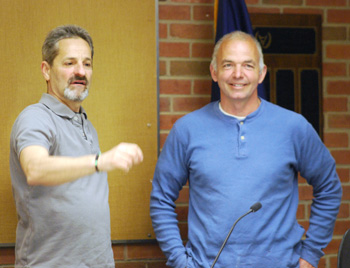Ann Arbor greenbelt advisory commission meeting (April 5, 2012): The main item on this month’s GAC agenda was a presentation by local farmer and food activist Richard Andres, who updated commissioners on the Washtenaw Food Hub, a new venture he’s leading that aims to shore up local farmers and build community.

From left: Dan Ezekiel, chair of the Ann Arbor greenbelt advisory commission, points out other GAC members to Richard Andres, who gave a presentation on the Washtenaw Food Hub. (Photos by the writer.)
Located on 16 acres in Ann Arbor Township, the food hub is envisioned to provide support for farmers to distribute and sell their produce, and for residents to buy food, attend workshops and create meaningful relationships with those who are part of the local food network. The project is still in its formative stages, but has potential to develop a food economy based on a human scale, Andres said, not a Wall Street scale.
GAC chair Dan Ezekiel noted that the hub is an example of the next phase of this region’s local food movement, which he said has “grown like an heirloom tomato” since the greenbelt program launched nearly a decade ago.
Commissioners also got a mid-year financial update on the greenbelt program at this month’s meeting, and heard about potential deep cuts to a federal farmland preservation program that has supported the greenbelt with more than $6 million in grants. The city has recently applied for $1,037,198 in additional grants that would help preserve 519 acres. Ginny Trocchio, support staff for the greenbelt program, also reported that over the next month there will likely be several closings on property within the greenbelt totaling another 300 acres.
Also at the April 5 meeting, Peter Allen – a local developer and GAC commissioner – proposed forming a strategic planning subcommittee to evaluate the greenbelt program so far and to look at what they’d like to accomplish in the future. It’s likely that the commission will formally consider his proposal at their May 3 meeting.
As it typically does, the meeting included a closed session to discuss land acquisitions. When commissioners emerged, they voted on three items – recommending that the city council approve the purchase of development rights on two properties, and to partner with Washtenaw County on a third acquisition. Ezekiel noted that the third item extends an existing county preserve on land that would provide public access and recreational opportunities.
At the end of the meeting, Ezekiel reported that a position on the commission will be opening up this summer. He urged anyone who’s interested to apply and “join the fun.” [Full Story]




